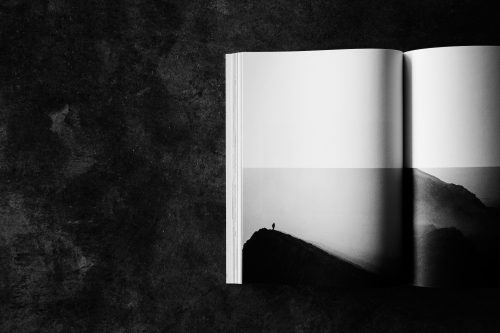This whole nonfiction-writing thing has been a beautiful accident. Before starting this blog in 2010, my only writing experience was with fiction, which I had tinkered with for nearly a decade. But, as I soon discovered, nonfiction was a different beast—a glaring ignorance to the genre is evident in my early essays in our archives.
Over time, however, I learned to love nonfiction, and today I write considerably less fiction as a result. In fact, in the last decade, Ryan & I have published three nonfiction books, but I have published only one novel in my entire life, most of which was written in my twenties.
Even with my current nonfiction bent, I still enjoy books of all kinds: novels, memoirs, self-help books, philosophical tomes, short-story collections. Here’s a short list of books that have affected me deeply over the years:
Lying by Sam Harris. While I usually recommend Sam’s wonderful book Waking Up, a seeker’s memoir about mindfulness (you can read my interview with Sam here), I find that Lying, in which Sam argues we can radically simplify our lives and improve society by merely telling the truth in situations where others often lie, is his most universally helpful book.
Freedom by Jonathan Franzen. The best realist fiction I’ve read, this book is this generation’s Great American Novel.
10% Happier by Dan Harris. This book finally helped me understand why I must meditate. Accordingly, I gift this book more than any other. (You can also read my interview with Dan.)
The Art of Memoir by Mary Karr. I can’t tell whether Mary is a poet or a memoirist—because she’s both. While all three of her memoirs are astoundingly good, this book is useful if you’re interested in writing narrative nonfiction. I may never write as beautifully as Mary Karr, but that doesn’t mean I won’t try.
Infinite Jest by David Foster Wallace. The best novel you’ll never read. Yes, it’s a long and complicated book, but getting to the end proves the real payoff comes only after drudging through the drudgery.
A Supposedly Fun Thing I’ll Never Do Again by David Foster Wallace. Wallace is the writer who influenced me more than any other, so it’s only right that he have two books on this short list. Although he’s best known for his fiction, I think this collection of essays is his masterpiece—especially the title essay, as well as my favorite piece, “Getting Away from Pretty Much Already Being Away from It All.” No one is able to capture absorptive detail like Wallace and also make it so utterly articulate and gorgeous.
Making Nice by Matt Summell. A few years ago, my favorite contemporary short-story writer finally published his first novel, Making Nice, which not-so-surprisingly reads like a loosely connected short-story collection. This novel is mimetic of everyday life—funny, sad, fragmented, and so alive I can feel it on my nerve-endings.
Total Money Makeover by Dave Ramsey. The most practical pick on this list. If you have consumer debt, this book is your blueprint to break free. Last year, I bought an entire case of this book and handed it to anyone in my life searching for a detailed plan to get out of debt.
Dead I Well May Be by Adrian McKinty. This is the book I credit most for sparking my desire to write fiction. It is a crime novel, but it isn’t trope-laden genre fiction: its prose is beautiful, its plot is enthralling, and its characters are so real you’ll forget you don’t know them personally.
FYI: The above links are Amazon affiliate links, which means I earn a tiny bit of money, at no additional cost to you, if you click through and buy a book. That’s obviously not why I’m recommending these books; I’m recommending them because they’ve added value to my life, and I hope they add value to your life. If I earn enough money to buy a cup of coffee along the way, that’s nice, too.


